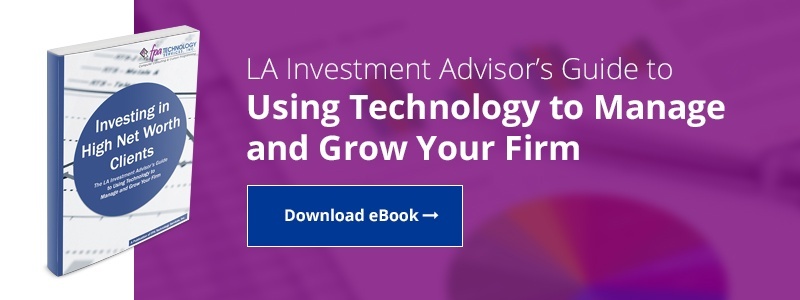 In your role as an LA Investment Advisor, you handle so many different types of sensitive data on a daily basis that it may be a struggle to keep up. Controlling the data and ensuring its security is vital, as a security breach or “data leakage” could prove catastrophic for the reputation of your business. And as we all know, for a service business your reputation is everything. So, how do you prevent such an eventuality?
In your role as an LA Investment Advisor, you handle so many different types of sensitive data on a daily basis that it may be a struggle to keep up. Controlling the data and ensuring its security is vital, as a security breach or “data leakage” could prove catastrophic for the reputation of your business. And as we all know, for a service business your reputation is everything. So, how do you prevent such an eventuality?
Here are 6 proactive ways that you and your firm to do ahead of time to prevent or at least minimize the impact of such an event:
1. Prior preparation prevents a disaster
First things first: if you’re to protect your company’s data from breaches or accidental leakage you must first recognize that such things can happen. Burying your head in the sand and failing to acknowledge the risks is one of the worst courses of action you could take. Next, you must identify the systems and data most at risk, and ensure you employ a data loss prevention system.
Do you know how you would handle a security breach or data leak? You don’t want to find out after such an event has occurred. It may also be a good idea to conduct background checks on all new members of staff – particularly those likely to be seeing sensitive data. When it comes to security and securing your network and your information, you can never be too careful!
2. Get a grip on your data
In order to protect your company’s data it is imperative to understand where and how it’s stored and in what format. As a Los Angeles based Investment Advisor, you will no doubt handle clients’ account information, their portfolios, market analysis and predictions. How do you ensure such information is kept safe? Now is the time to familiarize yourself with your company’s spyware and malware prevention systems, and the firewalls you have in place.
How can you expect to protect your data if you’re not even sure what measures have been put in place to maintain such information? In addition, it’s important for investment advisors to come to grips with the concept of securing your network. Scanning tools that will locate sensitive data are readily available, as you must know how and where to find such details in the event of data breaches or suspected attacks.
3. Get used to using encryption
Encryption is a fantastic way to protect data, ensuring that it’s protected while in transit or storage, and making things that much more difficult for hackers attempting to access your system. Encryption can be applied to files and folders within your computer’s networks as well as to external devices such as hard drives and USB sticks, essentially rendering leaked data useless to anyone without the encryption key.
4. Control who has access to your company’s data
Knowing where your company’s sensitive data is stored is one thing, but how do you ensure it stays secure? Content in motion, whether that’s via email or a type of external storage device, needs to be controlled in order to make sure that staff members aren’t unwittingly leaking vital information to outside parties. Again, there are a number of programs on the market that will scan in and outgoing communication for such data, while it’s important to have a series of controls in place to limit the number of people who have access to your business’s documents.
Do you have the ability to monitor who accesses your systems? Do you have a GPO (Group Policy Object) in place that prevents USB drives from being used? A good business owner should know enough about their systems to ensure that only those with a legitimate reason are accessing them.
5. Be prepared to lock down your network
Whether it was an accident, a misjudged email or an attack of malicious intent, data leaks can and do happen – even to the most prepared and pre-warned. If such an event were to occur, would you be able to lock down your email server and Internet browsers? Such actions may just save your company’s data and reputation.
The types of security protocol that you employ now will protect you against any events that may occur in the future. Are you prepared in how you would respond? Do you have a documented Cyber Security Incident Response Plan?
6. Monitor mobile devices
These days, it’s not only your office’s computers and phones you must worry about, but also the devices owned and used by your staff. Having the ability to control and monitor all personal devices while they’re connected to corporate networks is vital, and may be the difference between detecting a security breach before it causes any damage, and losing everything you’ve ever worked for.
How does your company prevent data leakage? Has such a thing ever happened to you before? If so, how did you recover? Please share you thoughts and experiences in the Comment field below.
And to follow-through on the concepts introduced here, be sure to download your free guide, Investing in High Net Worth Clients: The LA Investment Advisor's Guide to Using Technology to Manage and Grow Your Firm.
/fpa-logo-tagline.gif)






